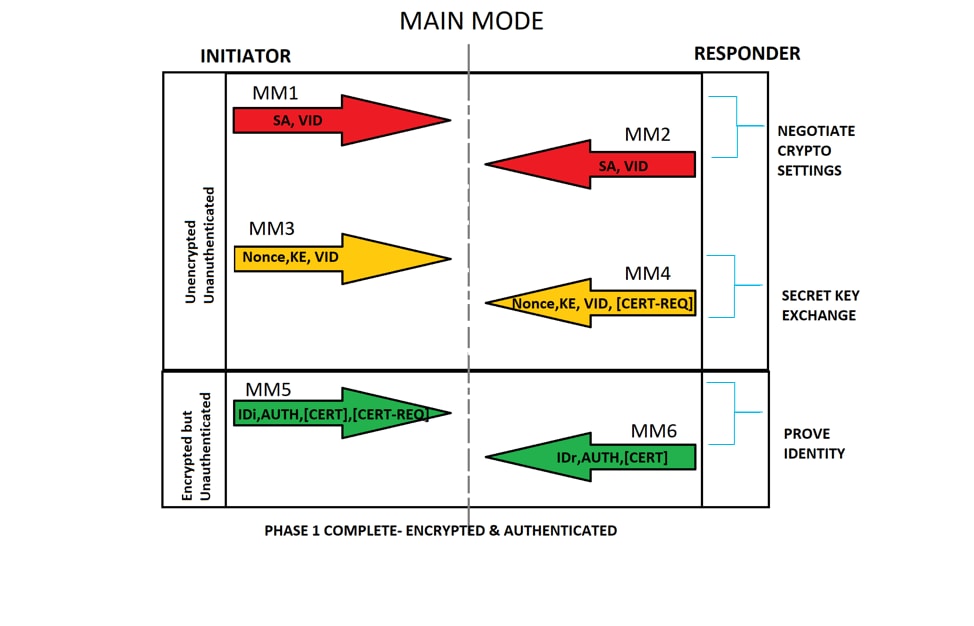Featured
Table of Contents
Understanding Ipsec Vpn
These negotiations take two forms, primary and aggressive. The host system that begins the procedure recommends encryption and authentication algorithms and settlements continue until both systems pick the accepted protocols. The host system that begins the process proposes its preferred encryption and authentication approaches however does not negotiate or change its choices.
When the data has been moved or the session times out, the IPsec connection is closed. The personal keys utilized for the transfer are erased, and the process comes to an end.
IPsec utilizes two main procedures to provide security services, the Authentication Header (AH) protocol and the Encapsulating Security Payload (ESP) protocol, in addition to several others. Not all of these protocols and algorithms have actually to be utilized the particular choice is determined during the Settlements stage. The Authentication Header protocol authenticates data origin and stability and offers replay defense.
Ipsec Protocol
The Kerberos protocol offers a central authentication service, enabling devices that utilize it to verify each other. Various IPsec executions might utilize different authentication methods, however the result is the exact same: the safe transfer of information.
The transport and tunnel IPsec modes have a number of key distinctions. File encryption is just applied to the payload of the IP package, with the initial IP header left in plain text. Transport mode is mainly used to supply end-to-end interaction in between two gadgets. Transport mode is mainly used in scenarios where the 2 host systems communicating are relied on and have their own security procedures in place.
File encryption is applied to both the payload and the IP header, and a new IP header is contributed to the encrypted packet. Tunnel mode provides a safe connection between points, with the initial IP packet covered inside a new IP package for extra security. Tunnel mode can be used in cases where endpoints are not relied on or are lacking security systems.
Ipsec Vpn
This suggests that users on both networks can communicate as if they remained in the exact same area. Client-to-site VPNs allow individual gadgets to connect to a network remotely. With this option, a remote employee can run on the very same network as the rest of their group, even if they aren't in the exact same place.
(client-to-site or client-to-client, for example) most IPsec topologies come with both advantages and downsides. Let's take a more detailed look at the advantages and disadvantages of an IPsec VPN.
An IPSec VPN is versatile and can be set up for various use cases, like site-to-site, client-to-site, and client-to-client. This makes it a good option for organizations of all shapes and sizes.
Ipsec Vpn


IPsec and SSL VPNs have one primary difference: the endpoint of each procedure. For the most part, an IPsec VPN lets a user link remotely to a network and all its applications. On the other hand, an SSL VPN develops tunnels to particular apps and systems on a network. This restricts the methods which the SSL VPN can be utilized however lowers the likelihood of a compromised endpoint resulting in a wider network breach.
For mac, OS (via the App Shop) and i, OS versions, Nord, VPN utilizes IKEv2/IPsec. This is a mix of the IPsec and Internet Secret Exchange version 2 (IKEv2) procedures. IKEv2/IPsec permits a secure VPN connection, without jeopardizing on web speeds. IKEv2/IPsec is just one choice offered to Nord, VPN users, however.
Stay safe with the world's leading VPN.
Ipsec (Internet Protocol Security)
Before we take a dive into the tech stuff, it is necessary to discover that IPsec has quite a history. It is interlinked with the origins of the Web and is the outcome of efforts to establish IP-layer encryption approaches in the early 90s. As an open protocol backed by constant advancement, it has shown its qualities throughout the years and although challenger protocols such as Wireguard have actually arisen, IPsec keeps its position as the most widely utilized VPN procedure together with Open, VPN.
SAKMP is a procedure used for establishing Security Association (SA). This treatment involves two actions: Phase 1 develops the IKE SA tunnel, a two-way management tunnel for key exchange. Once the interaction is established, IPSEC SA channels for safe and secure information transfer are established in stage 2. Qualities of this one-way IPsec VPN tunnel, such as which cipher, technique or key will be used, were pre-agreed by both hosts (in case of IPsec VPN, this is a connection in between an entrance and computer).
IPsec VPNs are widely used for numerous factors such as: High speed, Really strong ciphers, High speed of establishing the connection, Broad adoption by running systems, routers and other network devices, Of course,. There are alternative choices out there such as Open, VPN, Wireguard and others (see the list of essential VPN protocols on our blog site).
What Is Ipsec?
When developing an IKEv2 connection, IPsec uses UDP/500 and UDP/4500 ports by default. By basic, the connection is developed on UDP/500, however if it appears during the IKE facility that the source/destination lags the NAT, the port is changed to UDP/4500 (for details about a strategy called port forwarding, examine the short article VPN Port Forwarding: Excellent or Bad?).
There are numerous differences in terms of innovation, usage, benefits, and drawbacks. to encrypt HTTPS traffic. The purpose of HTTPS is to secure the content of communication between the sender and recipient. This ensures that anybody who wishes to obstruct interaction will not have the ability to find usernames, passwords, banking info, or other delicate information.
IPsec VPN works on a different network layer than SSL VPN. IPsec VPN operates on the network layer (L3) while SSL VPN operates on the application layer.
Gre Vs Ipsec: Detailed Comparison

When security is the main concern, contemporary cloud IPsec VPN need to be picked over SSL because it secures all traffic from the host to the application/network/cloud. SSL VPN protects traffic from the web internet browser to the web server only. IPsec VPN safeguards any traffic in between two points identified by IP addresses.
The issue of choosing in between IPsec VPN vs SSL VPN is carefully associated to the subject "Do You Need a VPN When A Lot Of Online Traffic Is Encrypted?" which we have actually covered in our current blog site. Some may believe that VPNs are hardly required with the rise of inbuilt file encryption directly in e-mail, web browsers, applications and cloud storage.
Latest Posts
Vpn.group: We Know Vpn - Reviews And Information -
Who Owns Your Vpn? 105 Vpns Run By Just 24 Companies
9 Best Vpns For Home And Business In 2022